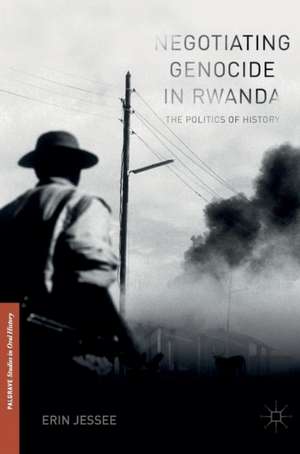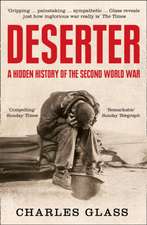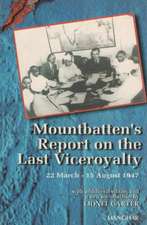Negotiating Genocide in Rwanda: The Politics of History: Palgrave Studies in Oral History
Autor Erin Jesseeen Limba Engleză Hardback – 31 ian 2017
| Toate formatele și edițiile | Preț | Express |
|---|---|---|
| Paperback (1) | 269.04 lei 6-8 săpt. | |
| Springer International Publishing – 18 aug 2018 | 269.04 lei 6-8 săpt. | |
| Hardback (1) | 535.98 lei 38-44 zile | |
| Springer – 31 ian 2017 | 535.98 lei 38-44 zile |
Din seria Palgrave Studies in Oral History
-
 Preț: 328.58 lei
Preț: 328.58 lei -
 Preț: 432.33 lei
Preț: 432.33 lei -
 Preț: 215.11 lei
Preț: 215.11 lei - 18%
 Preț: 732.40 lei
Preț: 732.40 lei - 15%
 Preț: 642.68 lei
Preț: 642.68 lei -
 Preț: 424.81 lei
Preț: 424.81 lei -
 Preț: 383.93 lei
Preț: 383.93 lei - 15%
 Preț: 646.11 lei
Preț: 646.11 lei -
 Preț: 421.93 lei
Preț: 421.93 lei -
 Preț: 391.61 lei
Preț: 391.61 lei -
 Preț: 216.48 lei
Preț: 216.48 lei -
 Preț: 317.52 lei
Preț: 317.52 lei -
 Preț: 389.11 lei
Preț: 389.11 lei -
 Preț: 416.34 lei
Preț: 416.34 lei -
 Preț: 215.33 lei
Preț: 215.33 lei -
 Preț: 213.05 lei
Preț: 213.05 lei -
 Preț: 381.81 lei
Preț: 381.81 lei -
 Preț: 391.61 lei
Preț: 391.61 lei -
 Preț: 199.37 lei
Preț: 199.37 lei -
 Preț: 389.70 lei
Preț: 389.70 lei -
 Preț: 215.54 lei
Preț: 215.54 lei -
 Preț: 418.29 lei
Preț: 418.29 lei -
 Preț: 393.52 lei
Preț: 393.52 lei -
 Preț: 216.30 lei
Preț: 216.30 lei -
 Preț: 384.09 lei
Preț: 384.09 lei -
 Preț: 201.06 lei
Preț: 201.06 lei -
 Preț: 423.84 lei
Preț: 423.84 lei -
 Preț: 389.70 lei
Preț: 389.70 lei -
 Preț: 213.58 lei
Preț: 213.58 lei -
 Preț: 430.79 lei
Preț: 430.79 lei - 15%
 Preț: 645.79 lei
Preț: 645.79 lei - 15%
 Preț: 592.44 lei
Preț: 592.44 lei - 15%
 Preț: 476.75 lei
Preț: 476.75 lei -
 Preț: 386.39 lei
Preț: 386.39 lei -
 Preț: 388.72 lei
Preț: 388.72 lei -
 Preț: 220.93 lei
Preț: 220.93 lei -
 Preț: 388.72 lei
Preț: 388.72 lei
Preț: 535.98 lei
Preț vechi: 582.59 lei
-8% Nou
Puncte Express: 804
Preț estimativ în valută:
102.55€ • 107.09$ • 84.69£
102.55€ • 107.09$ • 84.69£
Carte tipărită la comandă
Livrare economică 11-17 aprilie
Preluare comenzi: 021 569.72.76
Specificații
ISBN-13: 9783319451947
ISBN-10: 3319451944
Pagini: 302
Ilustrații: 12 schwarz-weiße Abbildungen, Bibliographie
Dimensiuni: 148 x 210 x 24 mm
Greutate: 0.51 kg
Ediția:1st ed. 2017
Editura: Springer
Colecția Palgrave Macmillan
Seria Palgrave Studies in Oral History
Locul publicării:Cham, Switzerland
ISBN-10: 3319451944
Pagini: 302
Ilustrații: 12 schwarz-weiße Abbildungen, Bibliographie
Dimensiuni: 148 x 210 x 24 mm
Greutate: 0.51 kg
Ediția:1st ed. 2017
Editura: Springer
Colecția Palgrave Macmillan
Seria Palgrave Studies in Oral History
Locul publicării:Cham, Switzerland
Cuprins
1. Introduction.- 2. An Official History - Commemorating 'The 1994 Genocide of the Tutsi'.- 3. Memorial Staff: Between Official Narrative and Lived Experience.- 4. Genocide Survivors: Complicating the Official Narrative.- 5. Convicted Génocidaires: Keepers of ‘Bad History’.- 6. Returnees: Looking Toward the ‘New Rwanda’.- 7. Considering Silences: Hutu Survivors? Tutsi Génocidaires? And what of the Twa?.- 8. Conclusion: The Danger of a Single Story.
Recenzii
“Presents a critical and insightful analysis of the politics of history in post-genocide Rwanda. … This book is best suited for readers who have experience or prior background in Rwandan history because it presents more complicated frameworks, aspects of history, and narratives about post-genocide Rwanda. … this book will provide a fascinating and refreshing look at the politics of history present in Rwanda, and a nuanced view of the challenges of confronting official narratives that have arisen since 1994.” (Samantha Lakin, Oral History Forum d’histoire Orale, Vol. 37, 2017)
Notă biografică
Erin Jessee is Assistant Professor in the Department of History at the University of Strathclyde and the Scottish Oral History Centre, UK.
Textul de pe ultima copertă
This book is an oral history-based study of the politics of history in the aftermath of the 1994 genocide in Rwanda. Using life history and thematic interviews, the author brings the narratives of officials, survivors, returnees, perpetrators, and others whose lives have been intimately affected by genocide into conversation with scholarly studies of the Rwandan genocide, and Rwandan history more generally. In doing so, she explores the following questions: How do Rwandans use history to make sense of their experiences of genocide and related mass atrocities? And to what end? In the aftermath of such violence, how do people’s interpretations of the varied forms of suffering they endured then influence their ability to envision and support a peaceful future for their nation that includes multi-ethnic cooperation?
Caracteristici
Offer a 'view from below' of the Rwandan genocide unlike most analyses Provides an analysis of individual Rwandans finding subtle ways to voice their own experiences and interpretations of the past Creates a methodological framework for conducting oral histories of genocide and war survivors














